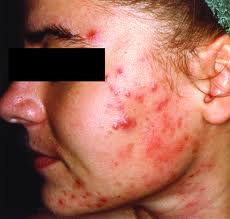The old dermatological dogma that diet can play a role in the development of acne has been tossed back and forth. Some parties agree, others disagree. An old study by Fulton et al., which goes back to 1969, claims that patients who ate chocolate bars were compared to those who ate”pseudo-chocolate”, and no difference was found between the two groups. Both had the same amount of acne lesions. Critics of this poorly designed study however point out, that the” fake chocolate” contained just as much sugar and just as much trans fat as real chocolate. Trans fats are also known to contribute to inflammation, a condition that is present in acne.
In the meantime a 2002 study that was published in the Archives of Dermatology has taken a closer look at acne. Researchers took a look at islanders from Papua, New Guinea, and the Ache people of Paraguay. Both groups eat a non-Western low-glycemic diet. 1315 subjects were checked, and not a single case of acne was found. Even though this is merely an observational study, the results are impressive. Similar results have been reported in Okinawans, the South African Bantus, the Zulu and the Inuit. Even though these groups are continents apart, the common denominator is the same. Each group eats a non-Western diet. Another publication in 2005 in the Journal of the American Academy of Dermatology evaluated data from the Nurses Health Study II for a link between teenage acne and milk intake, and there was indeed a positive association. It may be that a milk allergy could be the explanation. Further evaluation is needed to pinpoint, which active compounds in milk are the culprits.
For now research points out that hyperinsulinemia, a metabolic condition stemming from an overload of highly refined and high glycemic carbohydrate foods, and its related hormonal cascade is the crucial link between the Western diet and acne. Other factors may emerge from investigating how milk consumption worsens acne.
More info on acne: http://nethealthbook.com/dermatology-skin-disease/acne-vulgaris/
Reference: The Medical Post, May 31, 2005, page 29
Last edited October 28, 2014






